- Dr. Luna Kamau
- Dr. Eric Lelo
- Dr. Damaris Matoke
- Ms. Dorcas Wachira
- Ms Eva Aluvaala- Nambati
- Mr. Bernard Ong’ondo
- Mr. Edwin Too
- Ms. Nancy Kinyatta
- Mr. David Siele
- Ms. Milkah Mwangi
- Mr. Japheth Lusweti
- Mr. Anthony Muthee
- Mrs. Lucy Nungari
- Mr. Alex Chege
- Ms. Tiffany Wandera
- Ms. Rukiya Haji
- Mr. Kelvin Thiong'o
- Ms. Noel Oduor

Dr. Luna Kamau
Deputy Director CBRD
Dr. Luna Kamau is a Molecular Entomology and Ecology Researcher with over 22 years of experience in research and training in vector biology and control. She has held numerous research grants in the field of molecular and population genetic studies of disease vectors, vector ecology, and behaviour, insecticide resistance, development and testing of new tools for vector identification, analysis and control. She is widely published and has played a key role in supervised and mentored students and upcoming scientists in the field. Dr. Kamau also serves as the Deputy Director, Centre for Biotechnology Research and Development at KEMRI. Dr. Kamau is a member of the Kenya National Academy of Sciences (KNAS), a Fellow of the African Academy of Sciences and a Fellow of The World Academy of Sciences (TWAS).
Academic and professional qualifications
- PhD (Molecular Entomology)
- Diploma (Leadership & Management)
Professional/work /research experience
Dr. Luna has extensive experience in biomedical research, a good track record in the publication of scientific articles and acquisition of competitive research funding and experience in student mentorship and research leadership. Areas of research interest include:
- Molecular and population genetic studies of disease vectors
- Vector ecology and behavior, surveillance and insecticide resistance
- Mapping of genes associated with vector potential for malaria
- Development and testing of new tools for vector identification and analysis
- Development and testing of new insecticidal compounds
- Emerging malaria infections
Research Grants
- Principal Investigator, ANTI-VeC/ UK Global Challenges Research Fund (GCRF): Bionomics and molecular characterization of Microsporidia MB in Anopheles gambiae s.l. and Anopheles funestus in selected sites in Kenya, 2021 – 2022.
- Principal Investigator, WHO: Laboratory study on determination of discriminating concentrations of selected insecticide compounds for monitoring resistance in Phlebotomus duboscqui sand fly vector of leishmaniasis, 2020 -2022
- Principal Investigator, Bill and Melinda Gates Foundation Grant: Anopheles gambiae and Anopheles arabiensis genetic diversity and association with insecticide resistance in Kenya, 2019 – 2022.
- Principal Investigator, Kenya Government Research Grant: Mapping emerging infectious diseases in Kenya within the context of climate change, 2019 -2021.
- Co-Principal Investigator & Mentor, Kenya Government Research Grant: Occurrence, density & insecticide susceptibility of Anopheline mosquitoes in cluster regions of Isiolo County (PI Stanley Kitur), 2019 – 2021.
- Co-Principal Investigator, Swedish Research Council: Vector Control by Multiple Classes of Small Organic Compounds to Combat Mosquito-Borne Infectious Diseases and Sustain Insecticide Resistance (Co-PI Anna Linusson, Umeå University, Sweden), 2015 – 2021.
Selected Publications
- Nyangi M, Kigondu E, Irungu B, Nganga M, Gachanja A, Murigi M, Nyangacha R, Muniu E, Kamau L, Gathirwa J. 2021. Integrity, Use and Care of Long-Lasting Insecticidal Nets in Kirinyaga County, Kenya. BMC Public Health, 21:856.
- Kinuthia GK, Ngure V, Beti D, Lugalia R, Wangila A, Kamau L. 2020. Levels of heavy metals in wastewater and soil samples from open drainage channels in Nairobi, Kenya: Community health implications. Scientific Reports 10: 8434.
- Kinyatta NM, Wambua L Mutahi W, Mugasa C, Kamau L, Wachira D, Ichugu C, Waigi E, Githae R, Lusweti J, Kagai 2020. Molecular characterization and phylogenetic analysis of Wuchereria bancrofti in human blood samples from Malindi and Tana River Delta, endemic regions in Kenya, Journal of Biomedical Research and Reviews, Vol: 3, Issue: 1 (01-10).
- Knutsson S, Engdahl C, Kumari R, Forsgren N, Lindgren C, Kindahl T, Kitur S, Wachira L, Kamau L, Ekström F, Linusson A. Noncovalent Inhibitors of Mosquito Acetylcholinesterase 1 with Resistance-Breaking Potency. Journal of Medicinal Chemistry, 61, 10545 – 10557.
- Implications of Insecticide Resistance Consortium. 2018. Implications of insecticide resistance for malaria vector control with long-lasting insecticidal nets: trends in pyrethroid resistance during a WHO-coordinated multi-country prospective study. Parasites and Vectors, 11(1):550.
- Kiuru CW, Oyieke FA, Mukabana WR, Mwangangi J, Kamau L, Muhia-Matoke D. 2018. Status of insecticide resistance in malaria vectors in Kwale County, Coastal Kenya. Malaria Journal, 5;17(1):3
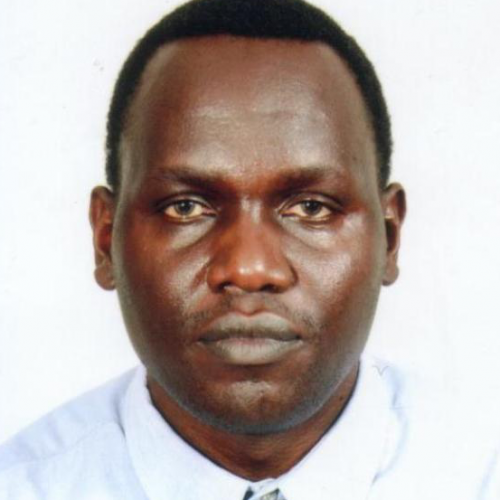
Academic and professional qualifications
- Doctor of Philosophy (PhD) Molecular Medicine
- Master of Science (MSc) Biotechnology
- Post Graduate Diploma in Research Methods
- Bachelor of Science (BSc) Biochemistry
Professional/work /research experience
- 1998-2000 Teacher, Arya Girls High School,
- 2000-2003 Assistant Research Officer, Kenya Medical Research Institute (KEMRI),
- 2003- 2013 Research Officer, KEMRI,
- 2013 –To date Senior Research Officer, KEMRI,
- 2011- To date Part-time Lecturer, Institute of Tropical Medicine, JKUAT,
- 2013- 2016 Senior Lecturer, Technical University of Kenya,
- 2013- 2016 Chairman, Department of Biochemistry, Technical University of Kenya
- 2016- 2021 Assistant Principal Research Officer, KEMRI
Research Grants
- Bill and Melinda Gates through ICGEB: COVID-19: Establishing rapid laboratory diagnostic programs in low-middle-income countries (LMICs) (Principal Investigator)
- Deutsche Forschungsgemeinschaft (DFG) grant, Germany. Freshwater pollution and the links to the distribution of Schistosoma host snails in Western Kenya (acronym SENTINEL-ll) (Co-Principal Investigator)
- Snail-related studies of transmission and control of schistosomiasis in Kenya. SSC No. 3540 (Co-Investigator).
Selected Publications
- Eric L. Agola, Ibrahim N. Mwangi, Geoffrey M. Maina, Joseph M. Kinuthia, Martin W. Mutuku. Transmission sites for Schistosoma haematobium and Schistosoma bovis identified in localities within the Athi River basin of Kenya using a PCR-RFLP assay. Heliyon; 7 (2) e06114. (2021)
- Ngari MG, Mwangi IN, Njoroge MP, Kinyua J, Osuna FA, Kimeu BM, Okanya PW, Agola EL. Development and evaluation of a loop-mediated isothermal amplification (LAMP) diagnostic test for detection of whipworm, Trichuris trichiura, in faecal samples. Journal of Helminthology. (2020). 94, e142, 1–7. https://doi.org/10.1017/
- Stella Wanjiku Gikunju, Eric L. Agola, Raphael Omusebe Ondondo, Johnson Kinyua, Francis Kimani, Angelle Desiree LaBeaud, Indu Malhotra, Charles King, Kelvin Thiong’o and Francis Mutuku. Prevalence of pfdhfr and pfdhps mutations in Plasmodium falciparum associated with drug resistance among pregnant women receiving IPTp-SP at Msambweni County Referral Hospital, Kwale County, Kenya. Malaria Journal (2020) 19:190 https://doi.org/10.1186/s12936-020-03263-z
- Jeremias M. Becker, Akbar A. Ganatra, Faith Kandie, Lina Muhlbauer, Jorg Ahlheim, Werner Brack, Baldwyn Torto, Eric L. Agola, Francis McOdimba, Henner Hollert, Ulrike Fillinger and Matthias Liess. Pesticide pollution in freshwater paves the way for Schistosomiasis transmission. Scientific Reports, natureresearch. https://doi.org/10.1038/s41598-020-60654-7
- Maxwell W. Waema ,1 Gerald Misinzo, John M. Kagira , Eric L. Agola , and Helena A. Ngowi. DNA-Detection Based Diagnostics for Taenia solium Cysticercosis in Porcine. Journal of Parasitology Research. Volume 2020, Article ID 5706981, 7 pages https://doi.org/10.1155/2020/5706981
- W. Ngonjo , Collins Okoyo , Elses Simiyu , Jimmy Kihara, Agola Eric Lelo , Ephantus Kabiru , Charles Mwandawiro.Effectiveness Of Albendazole On Soil-Transmitted Nematodes Among School Children. A Case Of Kakamega County, Kenya African Journal of Health Sciences, Volume 32, Issue No. 1, January – February 2019
- Mutuku M. W, Laidemitt MR, Beechler BR, Mwangi IN, Otiato FO, Agola EL, Ochanda H, Kamel B, Mkoji GM, Steinauer ML, Loker ES. A Search for Snail-Related Answers to Explain Differences in Response of Schistosoma mansoni to Praziquantel Treatment among Responding and Persistent Hotspot Villages along the Kenyan Shore of Lake Victoria. American Journal of Tropical Medicine and Hygiene; 101(1):65-77 (2019)
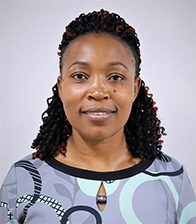
Dr. Damaris Matoke
Entomology Division Head
Damaris is a molecular biology research scientist with an interest in utilizing genomics in the control of vector-borne diseases. She holds a PhD in Molecular Medicine from Jomo Kenyatta University of Agriculture and Technology, MSc in Biotechnology and BSc in Biochemistry.
Damaris joined KEMRI, Centre for Biotechnology Research and Development (CBRD), Molecular Entomology laboratory in the year 2006 as an Assistant Research Officer and later rose to the position of Senior Research Officer. Currently, Damaris’ research is on malaria and leishmaniasis with a focus on exploring innovative vector control tools, vector bionomics, insecticide resistance monitoring, population genetic structure, parasite screening and characterization in correlation with ecological factors, disease epidemiology and climate change.
During her Post-Doctoral Fellowship at the International Centre of Insect Physiology and Ecology (ICIPE), with funding from the Wellcome Trust, Damaris was involved in investigating risk determinants of leishmania transmission and occurrence in Kenya, and explore development of an ‘attract and kill’ strategy for sandflies. Her PhD work focused on population genetics and insecticide resistance monitoring of malaria vectors in Western Kenya. Further, Damaris is involved in the investigation of malaria epidemiology and anopheles mosquito composition following intense malaria control activities and agricultural intensification in some parts of Kenya. In addition to her extensive experience working in disease prevention and vector control, Damaris is passionate in mentoring young career scientists and advocates for the advancement of the careers of women scientists. She supervises a number of PhD and MSc students.
In 2017, Damaris got recognized as the best young scientist and selected to be an Affiliate of the African Academy of Sciences for 2017-2021. She is an ASPEN new voices fellow. Damaris is a member of American Society of Tropical Medicine and Hygiene (ASTMH), Pan-African Mosquito Control Association (PAMCA), Multilateral Initiative on Malaria (MIM) and an Organizing Secretary for the KEMRI Annual Scientific Health (KASH)
Research Grants
- PI, Bill and Melinda Gates Foundation: Strengthening the role of women in the control of vector-borne diseases.
- CO-PI, ANTI-VeC Pump-Priming Grant, UK: Determining heritable microbe incidence, prevalence and impact in sandfly vector species.
- CO-I, Bill and Melinda Gates Foundation – The East-South Africa Anopheles funestus Consortium: Building the capacity for An. funestus entomological surveillance, insecticide resistance and genomic diversity studies in Malawi, Kenya, Uganda and Tanzania
- PI, Wellcome Trust Fellowship: Visceral Leishmaniasis: A proof of principle sand fly control study to reduce vector populations, and human-sand fly contact”.
- Co-I, Bill and Melinda Gates Foundation Anopheles gambiae and Anopheles arabiensis genetic diversity and association with insecticide resistance in Kenya
- CO-PI, National Research Fund (NRF): Magnitude and dynamics of Visceral and Cutaneous Leishmaniasis transmission in Baringo, Nyandarua and Nakuru Counties in Kenya
Selected Publications
- Barrack O. Omondi, Damaris Matoke-Muhia, Yasser Alraey, Jackline Milkah Mwangi Johnstone Ingonga, Philip M. Ngumbi, Aitor Casas-Sanchez, Alvaro Acosta-Serrano, Daniel K. Masiga (2019). Association of Phlebotomus guggisbergi with L. major and L. tropica in a complex transmission setting for cutaneous leishmaniasis in Gilgil, Nakuru county, Kenya (2019). PLoS NTD 18-01844
- Alex J. Limwagu, Emmanuel W. Kaindoa, Halfan S. Ngowo, Emmanuel Hape, Marceline Finda, Gustav Mkandawile, Japhet Kihonda, Khamis Kifungo, Rukiyah M. Njalambaha, Damaris Matoke-Muhia & Fredros O. Okumu (2019). Using a miniaturized double-net trap (DN-Mini) to assess relationships between indoor–outdoor biting preferences and physiological ages of two malaria vectors, Anopheles arabiensis and Anopheles funestus. Malaria Journal volume 18(282)
- Protus Omondi, Marion Burugu, Damaris Matoke-Muhia, Edwin Too, Eva A. Nambati, William Chege, Kelvin B. Musyoka, Kelvin Thiongo, Maureen Otinga, Francis Muregi, Francis Kimani (2019). Gametocyte clearance in Children, from western Kenya, with uncomplicated Plasmodium falciparum malaria after Artemether-Lumefantrine or Dihydroartemisinin-Piperaquine Treatment. Malaria Journal (accepted under review)
- Gabriel Kishoyian, Eliud N.M. Njagi, George O. Orinda, Francis T. Kimani, Kevin Thiongo, Damaris Matoke – Muhia (2019). Molecular Monitoring of Plasmodium falciparum Resistance to Sulfadoxine-pyrimethamine in Western Kenya, 14 Years after its Withdrawal. Ann Med Health Sci Res.2019; 9: 633-639
- Diba Dulacha Stephen Mwatha, Peter Lomurukai, Maurice Omondi Owiny, Wycliffe Matini, Zephania Irura, Fredrick Odhiambo, Titus Waititu, Damaris Matoke, Daniel Njenga, Hussein Boru, Abduba Liban, George Kirigi, Mark Obonyo (2019). Epidemiological characteristics and factors associated with Visceral Leishmaniasis in Marsabit County, Northern Kenya. J Interv Epidemiol Public Health. 2019 Mar; 2(1)

Ms. Dorcas Wachira
Immunology Division Head
- dwachira@kemri.go.ke
Research Interests.
Stem cell Research, Cancer Immunology and Immunotherapy
Academic and professional qualifications
- PhD Immunology, Kenyatta University (Ongoing)
- Master of Science in Immunology, Kenyatta University
- Bachelor of Science Zoology, Moi University
Professional/work /research experience
- Cell Biology and Regenerative Medicine in Pre-clinical Applications
- Applications of Flocytometry in research/ Immunophenotyping
- Cancer Immunology and Immunotherapy
- Generation of bone marrow derived mesenchymal stem cells
- Culture and propagation of bone marrow derived mesenchymal stem cells
- Proposal development and grant sourcing
- Review of proposals and manuscripts
- Assistant Lecturer, KEMRI Graduate School
- Curriculum development at a)KEMRI Graduate School b) Strategic Trade Control at the Kenya School of Revenue Administration
- Leadership and management experience
- Mentorship in Stem Cell Research
Current Research Grants
- Establishment of a Stem Cell Research Unit in KEMRI, National Research Fund (NRF)–KSh. 77.2M SERU No. 3967- Principal Investigator
- Generation, characterization, maintenance and propagation of mice Bone Marrow derived mesenchymal stem cells and their application in pre-clinical Animal model of diabetes – KEMRI Internal grants-7M, SERU No. 3553- Principal Investigator
- Inactivation of the PRH/HHEX tumor suppressor and its effects on inflammatory signalling in prostate cancer 2019 (Newton Utafiti Fund) Co–Principal Investigator
- Restorative capacity of Bone Marrow Derived- Stem Cells and their Immune-modulatory effects on Cutaneous Leishmaniasis skin lesions in BALB/c mice –Co-Investigator
- Role of Plasmodium falciparum HSP90 in antimalarial drug treatment outcome in a malaria endemic region, Kisumu Kenya, KEMRI internal grants-1M, SERU NO. 3439 –Principal Investigator
- Development and Evaluation of Helicase Dependent Isothermal DNA Amplification Method as Point-of-Care Diagnosis of Wuchereria bancrofti, KEMRI internal grants, Ksh. 1M, SSC. No. 2802, Co-Investigator
- Genomic Approaches for Understanding Breast Cancer Progression in Kenyan Patients-NRF funding –Co-Investigator
- Spatial distribution and Epidemiology of cancer in Kenya – Co-Investigator
- Evaluation of Isothermal Amplification methods and development of an Oligochromatographic dipstick assay for point-of- care diagnosis of Wuchereria bancrofti and disease surveillance in Kenya, SSE No. 2802- Co-Investigator
Selected Publications
- Dorcas Wachira, Raphael Lihana, Vincent Okoth, Alex Maiyo, and Samoel Ashimosi Khamadi Chemokine Coreceptor-2 Gene Polymorphisms among HIV-1 Infected Individuals in Kenya Disease Markers Volume 2015 (2015), Article ID 952067
- Beatrice Mukami Muriuki1, Michael Muita Gicheru1, Dorcas Wachira3, Anthony Kebira Nyamache23* and Samoel Ashimosi Khamadi3 Prevalence of Hepatitis B and C viral co-infections among HIV-1 infected individuals in Nairobi, Kenya (2013) BMC Research Notes 2013, 6:363
- Albert K; Willy K. Tonui; Michael M; Peter N; Johnstone I; Stella K; Laban N; Dorcas W; Robert K; Milkah M and Lydia N. Evaluation of the Adjuvanticity with Soluble Leishmania Major Antigens in BALB/c Mice (2009). Journal of Nanjing Medical University, 23(6): 1-14.
- Kimutai, Albert; Tonui, Willy K.; Gicheru, Michael M.; Ngure, Peter Kamau; Ingonga, Johnstone; Kepha, Stella; Njeru, Laban Ireri; Wachira Dorcas; Muhia, Robert Karanja; Mwangi, Milkah; Nyamwamu, Lydia B.Evaluation of the Adjuvanticity of Artemisinin with soluble Leishmania Major Antigens in BALB/c mice. Journal of Nanjing Medical University vol. 23 issue 6 November, 2009. p. 359-372

Academic & Professional qualifications
- PhD Ongoing
- MSc Molecular Biology
- BSc Biochemistry.
Professional/work /research experience
- Project lead; Training and Technical consultancy for forensic DNA laboratory set up for Directorate of criminal investigation Kenya
- Project Lead; Training and technical consultancy for forensic DNA laboratory set up for Bureau of forensics Puntland
- Identification of Mass fatality disaster victims and missing persons. Notably; Project Lead; DNA Identification victims of EL-ADE and Kulbiyow attacks.
- Expert witness in court, Preparation of Forensic DNA evidence reports such as sexual assault cases and presentation of evidence in court when required
- Paternity and family relationship testing
- Development of training curriculum, the development of an innovative training curriculum on forensic serology and DNA testing that is responsive to the increased demand for forensic DNA testing in the country.
- Project lead; Setting up and establishment of the Human DNA Identification laboratory in KEMRI
Current Research Grants
- Characterization of Forensic-Quality Haplotypes Representing the diversity of the Kenyan Population for the development of a Full Mitochondrial Genome Reference Database
- Testing new forensic DNA methods to enhance accountability for sexual violence in Kenya
Selected Publications
- Nambati EA, Njoka M, Eyase F, Majanja J, Njuguna N, Gitonga SM, Mwikwabe N, Lelo E, Mwangi M, Kingoro A, Kimani F, Lubano K, Bulimo W. Multidisciplinary approach towards training of the next generation of forensic DNA analysts in Africa; a Kenyan perspective. Forensic Sci Int Synerg. 2020
- Eva Aluvaala- Nambati, William Chege Kiarie, Allan Ole Kwallah, Francis Kimani. Strategies for DNA identification of persons in resource limited settings following a mass fatality incident: KEMRI experience Africa society of forensic medicine, 2019
- William Chege Kiarie, Sophie Mukwana, Njoka Muturi, Wamaitha Chege, Eva Aluvaala Nambati. Rare type 2 Tri-Allelic TPOX STR pattern observed in routine forensic DNA analysis Africa society of forensic medicine, 2019
- Wamaitha Chege, Sophie Mukwana, William Chege Kiarie, Njoka Muturi, Eva Aluvaala Nambati. Allele frequencies for 20 human autosomal STR Loci in the Kenyan population Africa society of forensic medicine, 2019
- Eva Aluvaala Nambati, Kiarie WC, Kimani F, 2017 Forensic DNA testing current and future practices in KEMRI KASH Abstract
.

Mr. Bernard Osero Ong’ondo
Research Officer
Research Interests
- Use of aptamers in the diagnosis of leishmaniasis
- Cytokine profiling on BALB/c mice infected with leishmania parasites
- Gene expression levels on uninfected commercial sex workers who are highly exposed to HIV-1 infection
- Gene expression on leishmania infected BALB/c mice treated with well-known drugs
- Transcriptomic approaches, the significance of genes, factors and cells for host protection on knockout and knockdown animal models
Selected Publications
- Barasa Mustafa, Ndeti Muia Cosmas, Wanjala Christine Ludwin, Ingonga Mwihwa Johnstone, Osero Bernard, Sarah Shinoko Muyonga, Wanyonyi Khakasa Mable, Frankline Tireito, Drinold Mbete, Kokonya Apollo Donald, Ozwara Suba Hastings, Zipporah Waithera Ng’ang’a, and Anjili Omukhango Christopher (2015). Cytokine-CpG Motif Oligodeoxynucleotide Co-Inoculation in BALB/c Mice Infected with Plasmodium berghei ANKA Strain. Journal of Medical and Biological Science Research, 1 (10), pp. 145-161
- Osero BO, Mosigisi A, Ogeto TK, Mugambi R, Ingonga J, Karanja RM, Gicheru M, Anjili C. (2015). Effects of glucocorticoids in Leishmania major infection. International Journal of Fauna and Biological Studies; 2 (3): 16-22
- Rose M. Nyamao, Zipporah O. Lagat, Khayeka W. Christopher, Bernard N. Jumba, Rebecca W. Waihenya, Robert Karanja and Bernard Osero Ong’ondo. (2014). Efficacy of glucocorticoids in controlling leishmania major infecting Balb/c mice. Journal of Infectious Diseases and Immunity, 6(2): 10-18
- Edwin Too, Sabah Omar, Joseph Makumi, Francis Kimani and Bernard Osero Ong’ondo. Evaluation of efficacy of artemether lumefantrine and dihydro-artemisinin piperaquine in the clearance of gametocytes in uncomplicated plasmodium falciparum malaria and effectiveness of microscopy and RT-PCR in gametocytes detection. Abstract A-004 (page 17) presented in the 2nd Kenya National Malaria Forum held in Kenya from 13th-14th October, 2014
- Ogeto T.K, Odhiambo R.A, Shivairo, R.S, Muleke C.I, Osero B.O, Anjili C, Ingonga J.M, Osuga I.M. (2013). Antileishmanial activity of Aloe Secundiflora plant extracts against Leishmania Major. Advances in Life Science and Technology, 13: 9-17
- Elijah M Songok, Bernard Osero, Lyle Mckinnon, Martin K Rono, Winnie Apidi, Elizabeth J Matey, Adrienne FA Meyers, Ma Luo, Joshua Kimani, Charles Wachihi, Blake T Ball, Frank A Plummer, Solomon Mpoke. CD26/ dipeptidyl peptidase IV (CD

Mr. Edwine Too
Research Officer
Research Interests
- Assessment of therapeutic efficacy to the antifolates, artemisinin and non-artemisinin based combinations against falciparum malaria.
- Molecular characterization and application of radionuclide techniques for the detection of drug-resistant malaria parasites.
- Monitoring of antimalarial drug efficacy using quantitative assays, e.g nucleic acid sequence-based amplification (QT-NASBA) and RT-PCR.
- Transmission dynamics studies post-artemisinin-based intervention.
- Parasite population studies determining the origin and dispersal mechanisms of resistant parasites.
- Human population studies investigating protection to malaria disease and prevalence of some human immune genes and other phenotypic markers.
- Diagnosis of malaria parasites.
- In vitro screening of traditional medicines for antimalarial activity, towards bio-prospecting for antimalarial agents.
Selected Publications
- Evaluation of Efficacy of Artemether Lumefantrine and Dihydro-Artemisinin Piperaquine in Clearance of Gametocytes in Uncomplicated Plasmodium Falciparum Malaria and Effectiveness of Microscopy and Rt-Pcr in Gametocytes Detection. Edwin Too, Sabah Omar, Joseph Makumi, Francis Kimani, Benard Ongondo.
- PfEMP1 DBLα Sequence Tags in Genomic DNA of P. falciparum Field Isolates from Two Malaria Endemic Sites in Kenya.Francis W. Makokha1, 2, 4* Sabah A. Omar4 Francis T. Kimani4 Gabriel Magoma4 Rahma Udu4, 6. Edwin Too4 Nathan Shaviya5 Charity Hungu4.
- In Vivo Anti-malarial Test of Essential Oil Extracted from Nigella sativa (L.) Seeds‟. The Journal of Ethnopharmacology. Sabah O mar, Rahma U. Yusuf, Edwin Too. (2009).
Ms. Nancy Kinyatta
Swenior Research Scientist
Ms. Kinyatta has a wide experience in diagnosis, prevention and control of parasitic infectious diseases, she is also experienced in Research ethics and handling of research animals and carrying out biosafety & Biosecurity with much interest in Dual use materials.
Additionally, Ms Kinyatta has vast experience in carrying out trainings on the identification of Weapons of Mass destruction (WMD) including Chemical, Biological, Radiological and nuclear explosives (CBRNe).
Her Reseach interests revolve around therapeutic stem cell research
Academic and professional qualifications
- PhD in Med. Parasitology, SBS, UoN (Ongoing)
- Master of Science in Medical Parasitology & Entomology- ITROMID, JKUAT
- Bachelor of Science in Animal Science, Egerton University
Current Research Grants
- Development and Evaluation of Helicase Dependent Isothermal DNA Amplification Method as Point-of-Care Diagnosis of Wuchereria bancrofti, KEMRI internal grants, SSC. No. 2802, PI
- “Evaluation of isothermal amplification methods and development of an Oligochromatographic dipstick assay for point-of- care diagnosis of Wuchereria bancrofti and disease surveillance in Kenya, SSE No. 2802, PI
- Mapping emerging infectious disease in Kenya within the context of climate change SERU NO. 3561, Co-PI
- To investigate the restoration capacity of BM stem cells on cutaneous leishmaniosis Skin lesions in Balb/C mice, SERU NO. 193, Co-investigator.
- Role of Plasmodium falciparum HSP90 in antimalarial drug treatment outcome in a malaria endemic region, Kisumu Kenya, SERU NO. 3439 Co-Investigator
- Generation, characterization, maintenance and propagation of mice Bone Marrow derived mesenchymal stem cells and their application in pre-clinical Animal model of diabetes, SERU NO. 3553, Co-Investigator
- Establishment of a stem cell research unit in KEMRI, SERU NO. 3967, Co-Investigator
Selected Publications
- Kinyatta Nancy, Wambua Lillian, Mutahi Wilkinson, Mugasa Claire, Kamau Luna, Wachira Dorcas, Githae Rosemary, Lusweti Japheth, Ichugu Christine, Waigi Emily, Kagai Jim, “Optimization of a Loop-Mediated Isothermal Amplification Assay as a Point-of-Care Tool for the Detection of Wuchereria bancroftiin Human Blood in Tana River Delta, Kenya”, Journal of Parasitology Research, vol. 2021, Article ID 6650870, 9 pages, 2021. https://doi.org/10.1155/2021/6650870
- Mutanu, K. N., Lillian, W., Wilkinson, M., Claire, M., & Luna, K. (2020). Molecular Characterization and Phylogenetic Analysis of Wuchereria Bancrofti in Human Blood Samples from Malindi and Tana River Delta, Endemic Regions in Kenya. J Biomed Res Rev, 3, 01-10.
- Kinyatta, N. M., Wangui Ng’ang’a, Z., Kamau, L., & Kagai, J. M. (2018). Comparison of Indoor Mosquito Collection Methods in the Assessment of Lymphatic Filariasis Transmission Dynamics in Mosquito Vectors in Tana River County, Kenya. EA Health Research Journal, 2(1), 58-66.
- Kinyatta NM, Ng’ang’a ZW, Kamau L, Githae RW, Lugalia R, Beti D and Kagai J. Determination of vectorial potential of Mansonia species in the transmission of Wuchereria bancrofti in Tana-Delta District, Coast-Kenya. East African Medical Journal V 88 No. 4, 2011

Mr. David Siele
Lab Technologist
Research Interests
Efficacy testing of medical significant pesticides chemicals to Leishmania related vectors and parasites
Selected Publications
- Lawyer PG, Mebrahtu YB, Ngumbi PM, Mwanyumba P, Mbugua J, Kiilu G, Kipkoech D, Nzovu J, Anjili CO.Phlebotomus guggisbergi (Diptera: Psychodidae), a vector of Leishmania tropica in Kenya. Am J Trop Med Hyg. 1991 Mar; 44(3): 290-8.
- Larvicidal effects of crude plant extracts from Tarchonanthus camphoratus (Family: Asteraceae) and Cassia didymobotrya (Family Ceasalpiniaceae on Culicine mosquitoes. Bernard Langat, David Siele, Faith Mwende, Christopher Anjili, Willy K. Tonui, Charles Mwandawiro, Charles Mutai, and Lawrence Muthami
Ms. Milkah Mwangi
Senior Research Scientist
Ms. Milkah Mwangi is a researcher in human health with over 15 years of experience in basic and clinical research at Kenya Medical Research Institute. Ms. Mwangi seeks to apply new and improved biological tools in finding a sustainable and feasible solution to the challenges caused by infections. She undertook her Bachelors of Science in Biomedical Science and Technology at Egerton University and her Masters of Science in Kenyatta University. She is also a Global Biorisk Curriculum Trainer and a Good Clinical and Laboratory Practice (GCLP) Trainer.
Ms. Mwangi is responsible for developing research protocols, carrying out research and contribute to the development of human health research and its dissemination. She is also responsible for day-to-day sample management activities in the sample management and receiving facility where she is involved in spearheading establishment and operations of the Facility
Current Research Grants
- Evaluation of Chrysanthemum cinerarifolium (Asterales: Asteraceae) extracts in the control of phlebotomine sand flies (Diptera: Psychodidae) in Marigat, Baringo County Role: Principal-investigator.
- An epidemiological investigation of Leishmania donovani in Merti Division, Isiolo County, Kenya. Role: Principal-investigator.
- Establishment of cost-effective laboratory methods to monitor Antiretroviral adherence in HIV-1 infected individuals on treatment. Role: Co-investigator.
- Mapping emerging infectious diseases in Kenya within the context of climate change. Role: Co-investigator
- Laboratory study on determination of discriminating concentrations of selected insecticide compounds for monitoring resistance in Phlebotomus duboscqui sand fly vector of leishmaniasis. Role: Co-investigator.
Selected Publications
- Owino B.O, Mwangi J.M, Kiplagat S., Mwangi H.N., Ingonga J.M, Chebet A., Ngumbi P.M, Villinger J., Masiga D.K., Matoke-Muhia D. (2021). Molecular detection of donovani, L. major, and Trypanosoma spp. in Sergentomyia squamipleuris sandflies from a visceral leishmaniasis focus in Merti sub-County, eastern Kenya. Parasites & Vectors 14:53
- Gitonga S., Lubano K., Kingoro A., Mwangi M., Mwikwabe N., Lelo E., Kimani F. and Bulimo W. (2020). Multidisciplinary approaches towards training of the next generation of forensic DNA analysts in Africa; a Kenyan perspective. Forensic Science International: Synergy (2), 123-125.
- Owino BO, Matoke-Muhia D, Alraey Y, Mwangi JM, Ingonga JM, Ngumbi PM, Casas-Sanchez A., Acosta-Serrano A. and Masiga DK. (2019) Association of Phlebotomus guggisbergi with Leishmania major and Leishmania tropica in a complex transmission setting for cutaneous leishmaniasis in Gilgil, Nakuru county, Kenya. PLoS Negl Trop Dis 13(10)
- Aritho, N.M., Ndungu, P.K., Inyangala., Mwangi, M., Gicheru, M.M., Ngeranwa, J.J.N. and Anjili, C.O. (2017). Efficacy of allopatric Tephrosia vogelii (Fabales: Fabaceae) against Phlebotomus (Phlebotomus) duboscqi (Diptera: Psychodidae). Open Journal of Plant Science, 2(1): 007-010
- K, Kasili S, Anjili C.O, Karanja R.M, Kaburi J, Mwangi M, Kinuthia G, Kiarie M, Nzau A, Kepha S, Maniania N.K, Ndegwa P.N, Irungu L, Ngumbi M.P (2015). Effects of Metarhizium anisopliae on sandfly populations in their natural habitats in Kenya. African Journal of Health Sciences 28(4):398-407
- Joel L. Lutomiah, Hellen Koka, James Mutisya, Santos Yalwala, Milka Muthoni, Albina Makio, Samson Limbaso, Lillian Musila, Jeff Clark, Michael J. Turell, Elizabeth Kioko, David Schnabel and Rosemary C. Sang (2011). Ability of selected Kenyan mosquito (Diptera: Culicidae) species to transmit West Nile virus under laboratory conditions. Journal of Medical Entomology
- Karanja R.M., Ingonga J., Mwangi M., Mwala D., Magambo J. K., and Tonui, W. K. (2011). Immunization with a combination of Leishmania major lipophosphoglycan (LPG) and Phlebotomus duboscqi salivary gland lysates (SGLs) abrogates protective effect of lipophosphoglycan against L. major in BALB/c mice. African Journal of Health Sciences Vol 18 (1-2) 2011: 1-5.

Mr. Japheth Lusweti
Lab Technologist
Research Grants
- NRF Infrastructure grant Co-Investigator in Establishment of a Stem Cell Research Unit
- Generation, Characterization, Maintenance and Propagation of Mice Bone Marrow Derived Mesenchymal Stem Cells and Their Application in Pre-Clinical Animal Model of Diabetes
- KEMRI IRG Grant- Co-PI Restorative Capacity of Bone Marrow-Derived Mesenchymal Stem Cells on Cutaneous leishmaniasis Skin Lesions in Balb/c Mice
Selected Publications
- Molecular Characterization and Phylogenetic analysis of Wuchereria bancrofti in human blood samples from Malindi and Tana River Delta, endemic regions in Kenya (2019)
- Antiproliferative Activity of Kenyan Trametes versicolor Aqueous Extract on Selected Cancer and Normal Cell Lines (2016)

Mr. Anthony Muthee
Laboratory Technologist
Selected Publications
- Antischistosomal activity of Azadiracta indica and Ekebergia capensis in mice infected with Schistosoma mansoni.
Rael Musili, Francis Muregi, Joseph Mwatha, David Muriu, Linus M’ Rewa, Timothy Kamau, Antony Menaine, Simon Chege, Joseph Thiong’o, Zipporrah Ng’ang’a and Kimani Gachuhi.

Mrs. Lucy Wanjiru Nungari
Senior Laboratory Technologist
Academic and professional qualifications
- Master of Science in Medical Parasitology and Entomology
- Bachelor of Science in Medical Microbiology
- Diploma in Applied Biology
- Certificate in animal health and production
- Artificial Insemination
- Senior Management Course
Professional/work /research experience
Mrs Nungari has a broad experience in Molecular Techniques
Current Research Grants
Development and Evaluation of wild-derived rats as potential experimental models of Research.
Selected Publications
Prevalence and Genotyping of Echinococcus Species from Livestock in Kajiado County, Kenya

Mr. Alex Jason Chege
Research Scientist
Research Interests
Mr. Chege’s research experience and interests include: evolutionary biology, molecular ecology and genetics applied to different capacities in the academic, conservation and human health research sectors.
Academic and professional qualifications
- Bachelor of Science in Zoology and a Bachelor of Science with Honours (2:1) with a specialization in Evolutionary Biology. His research examined interactions between Drosophila population genetics and its implications for mate selection and offspring fitness.
- Soon to begin, PhD in Ecology and Evolution at the State University of New York at Stony Brook.
Professional/work /research experience
Mr. Chege is a research scientist at the KEMRI Molecular Entomology and Ecology division of the Centre of Biotechnology and Research Development (CBRD). Currently, He is engaged in ongoing projects involving malaria surveillance across Kenya, mosquito resistance to insecticides and vector control. Molecular identification of Anopheles species using PCR, epidemiological surveillance of parasite presence and vector blood meal (transmission) using enzyme-linked immunosorbent assay (ELISA).
In addition, Mr. Chege has experience as research associate working on primate dietary and behavioural adaptations to coastal ecosystems of the Lamu Archipelago, to provide comparative evidence of potential homo sapiens dietary adaptations necessary for migration along coastal routes out of Africa. Turkana Basin Institute under the mentorship of Dr. Richard Leakey
Also, Mr. Chege has experience on global biodiversity conservation with projects including demographic and behavioural Ponitoring of Colobus monkeys at the Institute of Primate Research and Karura Forest Association. Previously he has worked as a research scientist at Operation Wallacea in Mexico where he led expedition surveys monitoring ecosystem health in a changing climate through Lepidoptera (Butterfly) species identification and community assemblage, training research assistants and student groups in research methods in the Selva Maya biological corridor of the Calakmul Biosphere Reserve.
Scholarships & Awards
- The State University of New York at Stony Brook PhD Academic support
- The Leakey Foundation Franklin Mosher Baldwin Fellowship and Joan Cogswell Donner Field School Scholarship.
Link
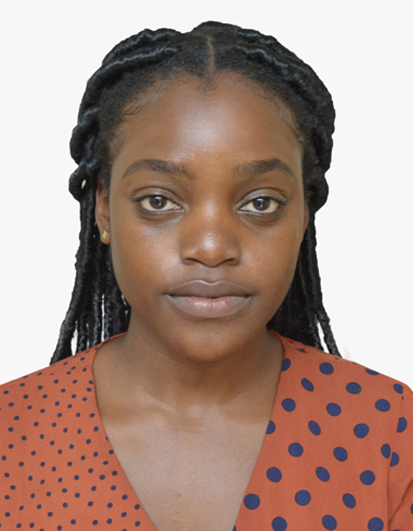
Academic and professional qualifications
- BSc in Genomics
- Trained in Biosafety and Bioethics.
Professional/work /research experience
Ms. Wandera is a research scientist at the KEMRI-HID laboratory in CBRD, dealing with human identification and genomics, involves DNA forensic services, DNA profiling of unidentified bodies, DNA relationship testing and among other DNA testing services and customer relations.
She was attached at United States Army Medical Research Directorate Africa (USAMRD-A) running molecular and immunological assays for surveillance of human respiratory viruses in the Kenyan civilian and military sites, training students and groups of organizations such as Kenya Defense Force (KDF) on molecular assays like sequencing. Co-investigator in a project with Leicester University, validating sample collection kits for Sexual Gender Based Violence (SGBV) cases for easy, low risk and non-invasive sample collection. Currently, a Co-investigator in an ongoing project of Sequencing Human mitochondrial DNA haplotypes in the Kenyan population. Assisted in projects of cell culture methodology to examine cytotoxic activities of green synthesized silver nanoparticles from ethanolic extracts of fruits and leaves of Annona muricata and 5-Fluorouracil against HeLa, PC3 and PNT1A cell lines. She is also experienced in cell culture techniques, molecular biology, human molecular genetics, and Bioinformatics.
Selected Publications
- Acknowledged in an Elservier article ‘In search of new anticancer drugs: Data for cytotoxic activities of green synthesized silver nanoparticles from ethanolic extracts of fruits and leaves of Annona muricata and 5-Fluorouracil against HeLa, PC3 and PNT1A cell lines’ (Gavamukulya et al., 2019) Elsevier Link
- Co-investigator in a project with Leicester University, of validating Sexual Gender based Violence (SGBV) sample collection kit for easy, low risk and non-invasive sample collection. Link
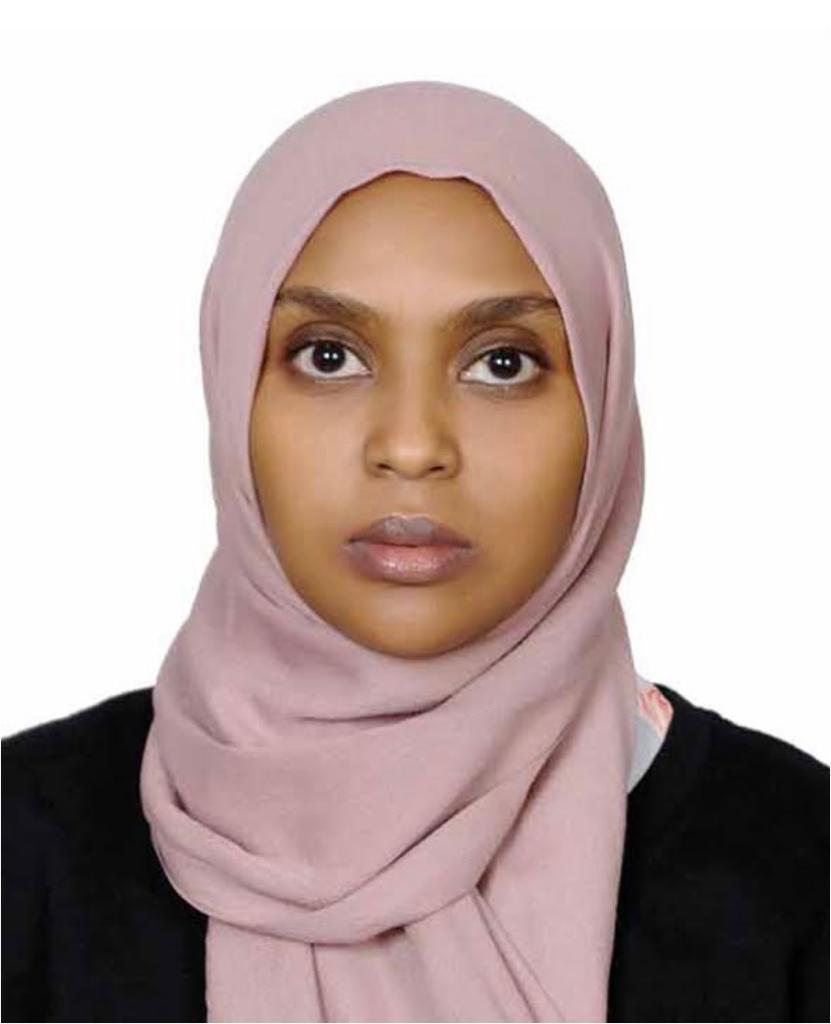
Academic and professional qualifications
- BSc (Hons) Biotechnology
- MSc Medical Microbiology
- Trained on Biosafety and Bioethics
Professional/Work /Research experience
Ms. Rukiya is a research scientist at the Immunology lab in CBRD dealing with stem cell research and cell immunology.
Focusing on cellular immunology in regard to vaccine and diagnostic development. Held a fellowship at Institute of Primate Research (IPR) attached at the department of tropical and infectious diseases dealing with Plasmodium species with a focus on Plasmodium knowlesi in the development of novel diagnostics, treatments and vaccine. Carried research at Fraunhofer Institute for Cell Therapy and Immunology, IZI in Leipzig, Germany, worked on novel pathogen inactivation methods using Low Energy Electron Irradiation. Experienced in cell culture, bioinformatics, basic Python programming. Currently doing a masters research investigating mechanisms of drug-resistance in Cancer at University of Kent, UK
Selected Publications
Low-Energy Electron Irradiation Efficiently Inactivates the Gram-Negative Pathogen Rodentibacter pneumotropicus—A New Method for the Generation of Bacterial Vaccines with Increased Efficacy (Link)

Academic and professional qualifications
- PhD- Tropical and Infectious Diseases, UoN – Ongoing
- Master of Science in Biotechnology
- Bachelor of Science in Biotechnology
Professional/work /research experience
- Development of Proficiency Testing (PT) panels for SARS-CoV-2
- Development of Recombinase Polymerase Amplification (RPA) kit for COVID-19 testing in low resource settings
- Take part in preparation and control of research budgets and financial payments.
- Notify subjects regarding all study aspects relevant to them.
- Keep track of study activities to make sure compliance with protocols and with all related local, state, and national regulatory and institutional polices.
- Manage necessary records of study related activity which includes case report forms, drug dispensation records etc.
- Communicate with laboratories or researchers about laboratory findings.
- Obtain industry-sponsored studies via personal contacts and professional organizations.
- Direct the request, collection, labelling, storage, or shipment of samples.
- Take part in meetings and seminars to update knowledge of clinical research and related issues.
- Enroll subjects in the study as per the study protocol.
- Prepare or get involved in quality assurance audits performed by study sponsors, regulatory authorities, or exclusively designated review groups.
- Prepare advertising and other educational materials and conduct campaigns to enroll subjects.
Current Research Grants
- Co- Investigator: One-step detection and confirmatory: Development of a rapid molecular-based fluorescence assay for the screening and monitoring of COVID-19 disease (Dr. Damaris Matoke- P.I)
- Co-Investigator: Genetic multiplicity in Plasmodium falciparum across diverse malaria endemic zones in Kenya (William Chege-P. I)
- Co-Investigator: Evaluation of the efficacy of Artemisinin combination Therapy in Kenya (Dr. Francis Kimani-P. I)
Selected Publications
- David Nderu, Francis Kimani, Kelvin Thiong’o, Maureen Akinyi, Evaline Karanja, Christian G. Meyer, Thirumalaisamy P. Velavan (2018). PfHRP2-PfHRP3 diversity among Kenyan isolates and comparative evaluation of PfHRP2/pLDH malaria RDT with microscopy and nested PCR methodologies. Parasitology International 67 (2018) 793–799
- Kelvin Thiong’o, J.Sivapraphba Evaluation of the antioxidant activity of Cassia alata leaves using precision cut goat liver slices as an in-vitro Indian journal of research. ISSN – 2250-1991 | IF: 5.761 | IC Value: 79.96
- Kelvin Thiong’o, J. Sivapraphba Production of synthetic seeds from nodal segments of Solanum nigrum. Indian Journal of Research. ISSN – 2250-1991 | IF: 5.215 | IC Value : 9.96
- David Nderu, Francis Kimani, Kelvin Thiong’o, Evaline Karanja, MaureenAkinyi, Edwin Too, William Chege, Eva Nambati3, Christian G. Meyer1,5,6 & Thirumalaisamy P.Velavan1, Plasmodium falciparum histidine- rich protein (PfHRP2 and 3)diversity in Western and Coastal Kenya. Scientific Reports | (2019) 9:1709 | https://doi.org/10.1038/s41598-018-38175-1.
- David Nderu, Francis Kimani, Kelvin Thiong’o, Evaline Karanja, MaureenAkinyi, Edwin Too, William Chege, Eva Nambati3, Christian G. Meyer1,5,6 & Thirumalaisamy P.Velavan1 “Genetic diversity and population structure of falciparumin Kenyan-Ugandan border areas” accepted for publication by Tropical medicine and international health journal
- Gabriel Kishoyan, Eliud N.M Njagi, George O. Orinda, Francis T. Kimani, Kevin Thiong’o, Damaris Matoke Muhia ‘Molecular monitoring of Plasmodium falciparum resistance to Sulfadoxine pyrimethaminein Western Kenya, 14 years after its withdrawal’ Annals of medical health sciences and Research
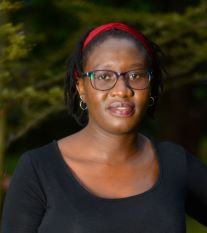
Academic and Professional Qualifications
- Master of science in Molecular medicine, JKUAT- ongoing,
- Bachelor of Technology in Applied Biology
Professional/work /research experience
Ms. Oduor is a Research scientist in a project based at KEMRI-CBRD, schistosomiasis division. Ms. Oduor has hands on expertise on several molecular techniques, which she has applied successfully in various projects. She is currently focusing her expertise researching on biological control of schistosomiasis targeting the snail, which is the intermediate host of the disease. She has also supported the institute in other areas such as SARS-CoV -2 surveillance through routine testing of the public and training of both students and Interns among Others.
In addition, Ms. Oduor has experience in Molecular virology research. She was a Research Intern at the KEMRI Laboratory for Molecular Biology – EID program, where she was involved in viral load monitoring of HIV positive Adults and diagnosis of infants at risk of contracting HIV during birth; This was done using Real-time PCR platforms. In the program, She also served as Capacity Building team lead where she was in charge of organizing Journal clubs, trainings and other team building activities.


